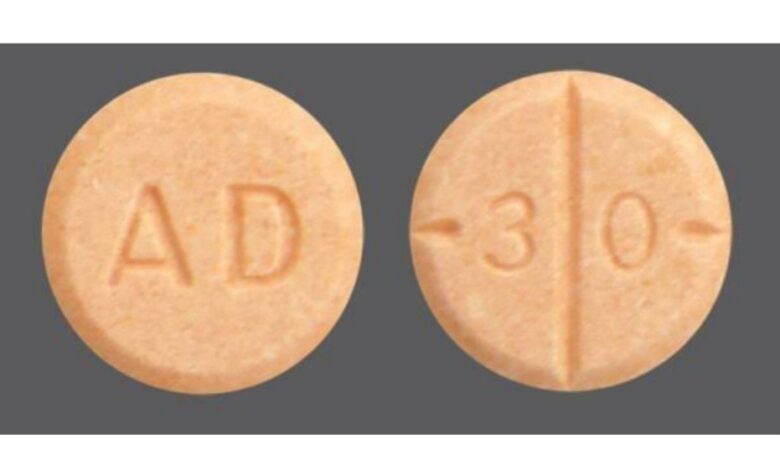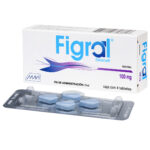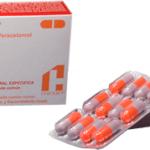AD 30 Pill: Side Effects, Dosage, Uses, and Review

The round orange pill with the imprint AD has been identified as Adderall 30 mg. It is supplied by Shire US Inc.. Adderall is a brand name for the combination of dextroamphetamine and amphetamine, a prescription drug used primarily to treat ADHD or narcolepsy (daytime sleepiness). The medication alters certain naturally-occurring chemicals in your brain by enhancing the effects of neurotransmitters such as dopamine and norepinephrine.
For ADHD, AD 30 Adderall is designed to improve hyperactivity, impulsive behavior, and attention span. According to the Cleveland Clinic, stimulants like Adderall improve symptoms of ADHD in 70 to 80 percent of children, and in 70 percent of adults. The positive effects can be even greater when it’s used along with behavioral therapy.
Adderall comes in either a tablet form or as a time-release capsule. It can interfere with sleep, so it should be taken in the morning. Your doctor will most likely start you off with a low dose to make sure you can tolerate it. Then, the dose can be slowly increased.
Before taking AD 30 orange pill, tell your doctor about any preexisting physical or mental health problems you have and list all other prescription and over-the-counter medications you take. Adderall is a federally controlled substance that should never be taken without medical supervision.
How should AD 30 Adderall be taken?
The AD 30 orange pill dosage your doctor prescribes will depend on several factors. These include:
- the type and severity of the condition you’re using Adderall to treat
- your age
- the form of Adderall you take
- other medical conditions you may have
Typically, your doctor will start you on a low dosage and adjust it over time to reach the dosage that’s right for you. They’ll ultimately prescribe the smallest dosage that provides the desired effect.
The following information describes dosages that are commonly used or recommended. However, be sure to take the dosage your doctor prescribes for you. Your doctor will determine the best dosage to suit your needs.
Off-label uses for AD 30 Pill
While these uses aren’t approved by the FDA, doctors may prescribe Adderall to treat other conditions besides ADHD and narcolepsy. This is called off-label use. It means a drug that’s approved to treat one condition is prescribed by a doctor to treat another condition that’s not approved.
Depression
AD 30 pill isn’t an antidepressant, but it’s sometimes used off-label to treat depression that doesn’t respond to other treatments. It may also be used to treat depression in people who have both ADHD and depression.
Some people who take Adderall or similar stimulant medication along with antidepressant medication have improved depression symptoms.
However, taking stimulants with antidepressants can increase the risk of side effects. Talk with your doctor before combining Adderall and any antidepressant medication.
Anxiety
AD 30 pill or similar stimulant medications are sometimes prescribed off-label for people with anxiety, especially for those who have both ADHD and anxiety. Some research suggests that combining stimulant medication with antidepressants might improve symptoms of ADHD and anxiety.
Bipolar disorder
AD 30 pill and other stimulants are sometimes prescribed off-label for treating symptoms of depression in people with bipolar disorder. When used for this purpose, stimulants aren’t usually used by themselves, but are combined with other bipolar medications.
Talk with your doctor before combining Adderall with medications used for bipolar disorder.
Other uses that aren’t approved
People may sometimes misuse Adderall without their doctor’s recommendation or prescription. In some cases, this type of misuse of Adderall can lead to abuse of the drug. You should never use Adderall if it hasn’t been prescribed for you by your doctor.
Weight loss
AD 30 pill can cause a loss of appetite. Because of this side effect, some people misuse Adderall as a weight loss aid.
Studying
Adderall is often misused by people without ADHD to increase focus, concentration, and endurance when studying. This occurs especially often with college students.
However, a recent study suggests that for people without ADHD, Adderall doesn’t improve thinking. In addition, it could worsen memory.
What are the side effects of AD 30 Adderall?
AD 30 pill can cause mild or serious side effects. The following list contains some of the key side effects that may occur while taking Adderall. This list doesn’t include all possible side effects.
For more information on the possible side effects of Adderall, or tips on how to deal with a troubling side effect, talk with your doctor or pharmacist.
More common side effects
The more common side effects of Adderall can include:
- lack of appetite
- dry mouth
- trouble sleeping
- headache
- stomach pain
- constipation
- nausea
- weight loss
- anxiety
- dizziness
These side effects may go away within a few days or a couple of weeks. If they’re more severe or don’t go away, talk to your doctor or pharmacist.
Serious side effects
Call your doctor right away if you have serious side effects. Call 911 if your symptoms feel life-threatening or if you think you’re having a medical emergency.
Serious side effects and their symptoms can include the following:
- heart problems including high blood pressure, rapid heartbeat, heart attack, and stroke
- depression
- hallucinations
- impaired or delusional thinking
- agitated or aggressive behavior
- irritability
- blurred vision
- severe allergic reaction
- muscle breakdown called rhabdomyolysis





